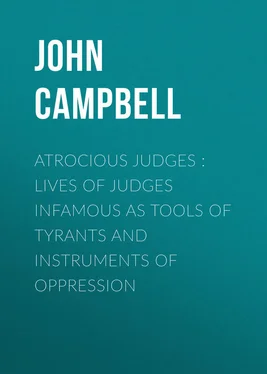John Campbell - Atrocious Judges - Lives of Judges Infamous as Tools of Tyrants and Instruments of Oppression
Здесь есть возможность читать онлайн «John Campbell - Atrocious Judges - Lives of Judges Infamous as Tools of Tyrants and Instruments of Oppression» — ознакомительный отрывок электронной книги совершенно бесплатно, а после прочтения отрывка купить полную версию. В некоторых случаях можно слушать аудио, скачать через торрент в формате fb2 и присутствует краткое содержание. Жанр: foreign_antique, foreign_prose, Биографии и Мемуары, на английском языке. Описание произведения, (предисловие) а так же отзывы посетителей доступны на портале библиотеки ЛибКат.
- Название:Atrocious Judges : Lives of Judges Infamous as Tools of Tyrants and Instruments of Oppression
- Автор:
- Жанр:
- Год:неизвестен
- ISBN:нет данных
- Рейтинг книги:5 / 5. Голосов: 1
-
Избранное:Добавить в избранное
- Отзывы:
-
Ваша оценка:
- 100
- 1
- 2
- 3
- 4
- 5
Atrocious Judges : Lives of Judges Infamous as Tools of Tyrants and Instruments of Oppression: краткое содержание, описание и аннотация
Предлагаем к чтению аннотацию, описание, краткое содержание или предисловие (зависит от того, что написал сам автор книги «Atrocious Judges : Lives of Judges Infamous as Tools of Tyrants and Instruments of Oppression»). Если вы не нашли необходимую информацию о книге — напишите в комментариях, мы постараемся отыскать её.
Atrocious Judges : Lives of Judges Infamous as Tools of Tyrants and Instruments of Oppression — читать онлайн ознакомительный отрывок
Ниже представлен текст книги, разбитый по страницам. Система сохранения места последней прочитанной страницы, позволяет с удобством читать онлайн бесплатно книгу «Atrocious Judges : Lives of Judges Infamous as Tools of Tyrants and Instruments of Oppression», без необходимости каждый раз заново искать на чём Вы остановились. Поставьте закладку, и сможете в любой момент перейти на страницу, на которой закончили чтение.
Интервал:
Закладка:
His ambition grew with his success, and nothing would satisfy him but official preferment. Now began the grand controversy respecting the succession to the crown; and the claim to it through the house of Mortimer, which had long been a mere matter of speculation, was brought into formidable activity in the person of Richard, Duke of York. Billing, thinking that a possession of above half a century must render the Lancastrian cause triumphant, notwithstanding the imbecility of the reigning sovereign, was outrageously loyal. He derided all objections to a title which the nation had so often solemnly recognized; enlarging on the prudence of Henry IV., the gallantry of Henry V., and the piety of the holy Henry VI., under whose mild sway the country now flourished, happily rid of all its continental dependencies. He even imitated the example of Sir John Fortescue, and published a treatise upon the subject, which he concluded with an exhortation “that all who dared, by act, writing, or speech, to call in question the power of Parliament to accept the resignation of Richard II., or to depose him for the crimes he had committed, and to call to the throne the member of the royal family most worthy to fill it, according to the fashion of our Saxon ancestors, should be proceeded against as traitors.” This so pleased Waynflete, the chancellor, and the other Lancastrian leaders, that Billing was thereupon made king’s serjeant, and knighted.
When the right to the crown was argued, like a peerage case, at the bar of the House of Lords, Billing appeared as counsel for Henry VI., leading the attorney and solicitor general; but it was remarked that his fire had slackened much, and he was very complimentary to the Duke of York, who, since the battle of Northampton, had been virtually master of the kingdom.
We know nothing more of the proceedings of this unprincipled adventurer until after the fall of Duke Richard, when the second battle of St. Alban’s had placed his eldest son on the throne. Instantly Sir Thomas Billing sent in his adhesion; and such zeal did he express in favor of the new dynasty that his patent of king’s serjeant was renewed, and he became principal law adviser to Edward IV. When Parliament assembled, receiving a writ of summons to the House of Lords, he assisted in framing the acts by which Sir J. Fortescue and the principal Lancastrians, his patrons, were attainted, and the last three reigns were pronounced tyrannical usurpations. He likewise took an active part in the measures by which the persevering efforts of Queen Margaret to regain her ascendency were disconcerted, and Henry VI. was lodged a close prisoner in the Tower of London.
Sir John Markham, the honorable and consistent Yorkist, now at the head of the administration of the criminal law, was by no means so vigorous in convicting Lancastrians, or persons suspected of Lancastrianism, as Edward and his military adherents wished; and when state prosecutions failed, there were strong murmurs against him. In these Mr. Serjeant Billing joined, suggesting how much better it would be for the public tranquillity if the law were properly enforced. It would have appeared very ungracious, as well as arbitrary, to displace the chief justice, who had been such a friend to the house of York, and was so generally respected. That there might be one judge to be relied upon, who might be put into commissions of oyer and terminer, Billing was made a puisne justice of the Court of King’s Bench. He was not satisfied with this elevation, which little improved his position in the profession; but he hoped speedily to be on the woolsack, and he was resolved that mere scruples of conscience should not hold him back.
Being thus intrusted with the sword of justice, he soon fleshed it in the unfortunate Walter Walker, indicted before him on the statute 25 Edward III., for compassing and imagining the death of the king. The prisoner kept an inn called the Crown, in Cheapside, in the city of London, and was obnoxious to the government because a club of young men met there who were suspected to be Lancastrians, and to be plotting the restoration of the imprisoned king. But there was no witness to speak to any such treasonable consult; and the only evidence to support the charge was, that the prisoner had once, in a merry mood, said to his son, then a boy, “Tom, if thou behavest thyself well, I will make thee heir to the Crown.”
Counsel were not allowed to plead in such cases then, or for more than three centuries after; but the poor publican himself urged that he never had formed any evil intention upon the king’s life, – that he had ever peaceably submitted to the ruling powers, – and that though he could not deny the words imputed to him, they were only spoken to amuse his little boy, meaning that he should succeed him as master of the Crown Tavern, in Cheapside, and, like him, employ himself in selling sack.
Mr. Justice Billing, however, ruled —
“That upon the just construction of the statute of treasons, which was only declaratory of the common law, there was no necessity, in supporting such a charge, to prove a design to take away the natural life of the king; that any thing showing a disposition to touch his royal state and dignity was sufficient; and that the words proved were inconsistent with that reverence for the hereditary descent of the crown which was due from every subject under the oath of allegiance; therefore, if the jury believed the witness, about which there could be no doubt, as the prisoner did not venture to deny the treasonable language which he had used, they were bound to find him guilty.”
A verdict of guilty was accordingly returned, and the poor publican was hanged, drawn, and quartered. 34 34 Some of our American advocates of constructive treasons have laid down the law much in the same spirit. — Ed.
Mr. Justice Billing is said to have made the criminal law thus bend to the wishes of the king and the ministers in other cases, the particulars of which have not been transmitted to us; and he became a special favorite at court, all his former extravagances about cashiering kings and electing others in their stead being forgotten, in consideration of the zeal he displayed since his conversion to the doctrine of “divine right.”
Therefore, when the chief justice had allowed Sir Thomas Cooke to escape the penalties of treason, after his forfeitures had been looked to with eagerness on account of the great wealth he had accumulated, there was a general cry in the palace at Westminster that he ought not to be permitted longer to mislead juries, and that Mr. Justice Billing, of such approved loyalty and firmness, should be appointed to succeed him, rather than the attorney or solicitor general, who, getting on the bench, might, like him, follow popular courses.
Accordingly, a supersedeas to Sir John Markham was made out immediately after the trial of Rex v. Cooke , and the same day a writ passed the great seal, whereby “the king’s trusty and well-beloved Sir Thomas Billing, Knight, was assigned as chief justice to hold pleas before the king himself.”
The very next term came on the trial of Sir Thomas Burdett. This descendant of one of the companions of William the Conqueror, and ancestor of the late Sir Francis Burdett, lived at Arrow, in Warwickshire, where he had large possessions. He had been a Yorkist, but somehow was out of favor at court; and the king, making a progress in those parts, had rather wantonly entered his park, and hunted and killed a white buck, of which he was peculiarly fond. When the fiery knight, who had been from home, heard of this affair, which he construed into a premeditated insult, he exclaimed, “I wish that the buck, horns and all, were in the belly of the man who advised the king to kill it;” or, as some reported, “were in the king’s own belly.” The opportunity was thought favorable for being revenged on an obnoxious person. Accordingly he was arrested, brought to London, and tried at the King’s Bench bar on a charge of treason, for having compassed and imagined the death and destruction of “our lord the king.”
Читать дальшеИнтервал:
Закладка:
Похожие книги на «Atrocious Judges : Lives of Judges Infamous as Tools of Tyrants and Instruments of Oppression»
Представляем Вашему вниманию похожие книги на «Atrocious Judges : Lives of Judges Infamous as Tools of Tyrants and Instruments of Oppression» списком для выбора. Мы отобрали схожую по названию и смыслу литературу в надежде предоставить читателям больше вариантов отыскать новые, интересные, ещё непрочитанные произведения.
Обсуждение, отзывы о книге «Atrocious Judges : Lives of Judges Infamous as Tools of Tyrants and Instruments of Oppression» и просто собственные мнения читателей. Оставьте ваши комментарии, напишите, что Вы думаете о произведении, его смысле или главных героях. Укажите что конкретно понравилось, а что нет, и почему Вы так считаете.












